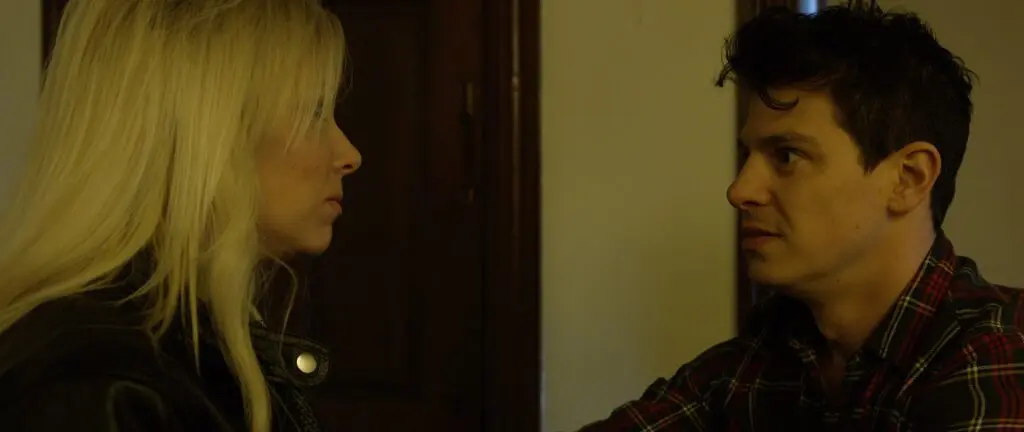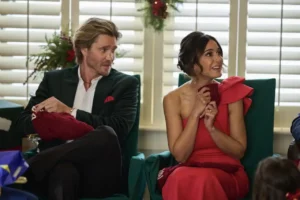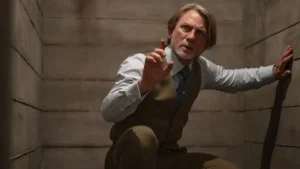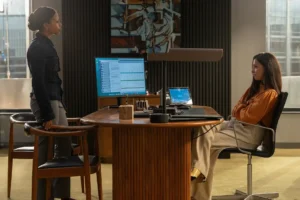While we’ve taken measures to prevent spoilers for The Special in this interview, some references were unavoidable, and as such readers might be able to piece things together that they’d be better off experiencing for themselves. There’s nothing overt, but you know — you’ve been warned.
Something I love about the film festivals I’ve attended or covered to date is the sheer breadth of variety. The Special is an utterly different film to Ropes, and this next interview totally different to my first one, too: I had a lovely one-to-one conversation with the director of Ropes, but the next day’s interview was with a panel of eight, and it was just as much fun as fascinating.
I’ll give you a brief description of The Special, but I warn you now: no two-sentence summary can represent this film well; you have to see it. It’s about Jerry, who is distraught to think his wife could be unfaithful, and so his friend persuades him to visit Madame Zhora’s parlor and indulge in “the special”. Once is enough, says Mike, and you’ll feel much better. But for Jerry, one visit is enough to get him addicted.
First, Mark Kosobucki (special effects) said “hello”, and then was joined by Sarah French (Jerry’s wife, Lisa), who whooped at the prospect of a mini-reunion when she saw Doug Henderson (Madame Zhora’s security man, Ivan) and Mark Steensland (co-writer) were on their way. By the time Davy Raphaely (Jerry), Paul Cottman (Detective Barnes), James Newman (the other co-writer), Matt Nease (cinematographer), and finally B Harrison Smith (director) joined the video call, everyone was getting a bit giggly.
I felt uncommonly shy and awkward at the prospect of discussing a frankly sordid film about sex and addiction. So I jumped in and asked Davy Raphaely how he managed to keep a straight face when filming the sex scenes. (I’ll xxx out the spoilers, but some of the interview would have been impossible without them.) And my ignorant question opened my eyes to how radically different the experience of a film can be for the team involved than the viewer: Davy didn’t have an issue with the straight face: taking it seriously was the natural thing to do because his character Jerry “was taking it seriously at the time. And if you substitute the xxx for any other type of drug or anything, it makes sense, and that’s what I did to get through it.”
Having got to the subject of the metaphor so quickly, I asked the writers where the idea for The Special came from. “The idea was about addiction, and how it changes a person, it can become all-consuming,” Mark Steensland told me. When he first brought his idea to the other writer, James Newman was skeptical, but then the bizarre concept drew him in: “if you’re looking for a gruesome eighties-style horror flick, you’re gonna get it, but there’s so much more beneath the surface. The story about someone suffering from addiction, and that’s what really appealed to me.”
I continued with the writers for the next question: which is more difficult, a good ending, or a good opening? Mark Steensland likes to start with the ending and work backward from that; though in this case, the core idea came first. He digressed to tell me that originally, it was about aliens: “the “specials” were essentially Tribbles, which multiplied and were going to take over, but it was going to be a big canvass and wasn’t going to work. So we narrowed it down to a single person’s interaction which made it more interesting, made the metaphor more powerful. And it also ultimately led to that particular ending. Yeah, endings are important.”
Harrison piped up for the first time: “Now I’ve got this mental image of a gang bang with lots of little specials going on…” (which I joked could be in the sequel) …”that’s really cool!”
He picked up the topic of the film’s themes and raised one I confess I hadn’t drawn out from it myself: “It’s definitely a commentary on misogyny and the long-suffering wife. Who would cheat on this wife? She’s lovely, she’s charming, she’s willing to put up with a lot of garbage until finally, she reaches a breaking point. Both of them have their own breaking points. He says some really mean things to her and we can feel for her reaction, especially her reaction when she finally sees xxxxxxx. It’s our reaction: that’s what we were going for.
“All the women in the film, not just Lisa, are downplayed. I’d love to know more of Madame Zhora’s story. But from the point of view of the male characters, the women don’t matter much, they are objectified and not really much more than holes, actually. They are used for pleasure and once the men are done, they move on. The writers have done the groundwork here, but what I loved was Matt’s cinematography that really brought that out by implication, isolating the women in the angles he uses. And the room! The room that the xxxx was in was lit beautifully; then add the smooth sax music and everything is set up just for Jerry’s pleasure. The misogyny comes out in how he treats Lisa, but also how everything is about him.”
Newman added another perspective on the misogyny (I am going to be so aware of this when I watch the film again!), in that the women are written with two purposes: “Women in this movie either exist to give pleasure to men, or there is some perceived slight to Davy’s character, an obstacle to his pleasure. This makes the whole thing even sadder.”
Harrison clearly found Jerry’s selfish outlook sad too: “All he had to do was go home and talk to his wife, but no, he was led by the nose to revenge, and he goes with it. He had so many opportunities to go back and fix things with his wife, but he made a conscious decision to keep going.”
Doug praised Sarah at this point, saying her portrayal shows that the film “is making a point about these issues, and not embracing them.” He was blown away by her subtlety which allows the audience to latch on to her feelings, and see the theme in the film of toxic masculinity. Sarah responded that she tries to make things as real as possible in her roles, and subtlety is key; of course, she thanked him for his comments.
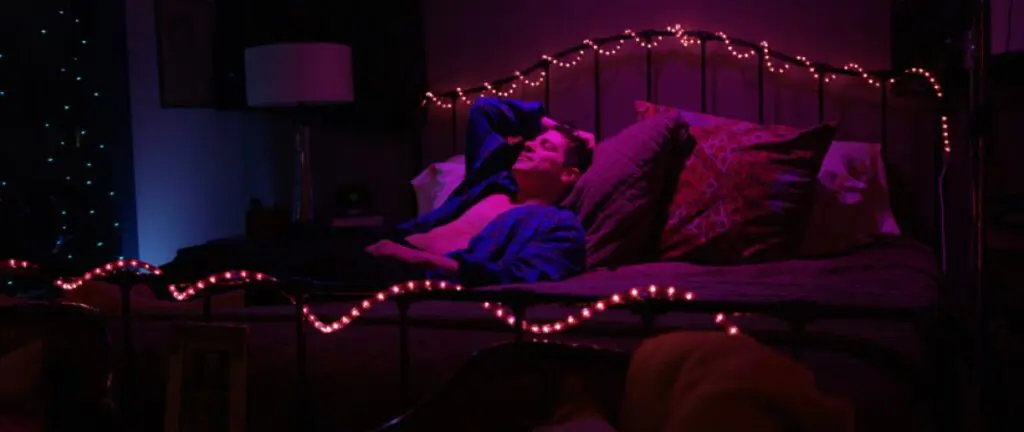
With several actors on the call, several of whom are well used to horror roles, I dared myself to change the tone of the conversation and asked “is this the sleaziest film you’ve been in?” But the professional tone just wouldn’t go. Davy Raphaely: “You know I don’t really find it sleazy. For me, it was a joy because Jerry goes on such a wild ride, and I had the chance to experience that from beginning to end. I’ve done a lot of deaths, but never a transformation like this one, which was fun.”
Paul Cottman raised an interesting question here: he said he had been in a film that centered on infidelity, but there “was no sci-fi element, and maybe that’s what makes this one more sleazy.” Doug Henderson also had an interesting insight: “One of the things with acting, once you accept the world that you’re in, you can’t be thinking about what the audience is going to think about the film as a whole. You have a job to do, and as an actor, you have to accept that world and what is happening, you have to know your role in the context of that world. We don’t think about how the film is going to be perceived, we just show up and do it.”
Harrison added something here which made me think he was aware of the film’s potential aura of sleaze: “Your role as a director is to reassure the actors that you’re not going to exploit them or demean them in any way. In first approaching the two leads, who had the most sexual content, we had to let them know they’re in good hands… we didn’t have Sarah in the film just to take her clothes off: it was a performance, the sex was integral to the story, not just thrown in. I assured Davy too that this wasn’t going to be some kind of spoof, we weren’t going to expect full-frontal nudity, or make him look ridiculous. They know me and know I’m not going to put them in a bad film, and know they’re going to work with a professional crew too.”
Sarah French confirmed this: “It was a small group, and I felt nothing but comfortable. Davy went through a lot, and he did such an amazing job. And I had such a blast playing Lisa. She really wanted to rekindle what she felt they’d lost, and that’s what I wanted to bring to life.”
I couldn’t help turning the conversation to Doug, commenting that Ivan was my favorite character because he was the most accepting, simply took people as they are, and presented no deception at all. Funnily enough, two of the crew said they hadn’t recognized Doug at first, in earlier video interviews… but he was too modest to take the attention for long.
I moved the conversation away from The Special then. Having not seen any other B Harrison Smith films before, I asked which other title he would recommend I try next. It was an easy answer: Camp Dread, his first film. “Although I’m really proud of my action-comedy Garlic & Gunpowder. I laughed all day, and I’ve got to tell you if you make this horror stuff all the time it gets to you: everything’s dark and depressing and bloody and mean. Garlic & Gunpowder was just a screwball comedy and I loved it. I’m just really lucky to be where I’m at, making films with these people. I used to devour Fangoria magazine when I was growing up. John Carpenter and George Romero ran their sets like a family; the word “family” can be overused, we’re not related, but we’re intimate together for a short amount of time. And I’d rather make films with these people than the finest people in the world.”
Each of this crew is still working, some on a film together, and it was good to hear that the pandemic hadn’t made everything stop. Said Harrison, “We worked within the proper health parameters, but you know, you’ve got to keep swimming.” Paul Cottman said the lockdown had prompted new creative outlets and relationships, that he and others he knew had been writing scripts during the last few months. “You can’t stop being creative, even if you don’t know what might start or stop from one day to the next.”
On the topic of the current health climate, I asked what a “virtual” Grimmfest would mean to them. Harrison responded that “aside from just getting the word out, it’s also great to hear the positive responses that the film is getting, that people are picking up on the messages. It’s important to me that the word will go out – I’m sure Grimmfest will – that this film is not what you might expect. And also hope that the distributors (Blue Fox Entertainment and Red Hound Films) will benefit: there is value in hard media. Matt’s cinematography really deserves a BluRay release.”
The comment that the film is not what you might expect led me to mention the publicity tag: “The Blob meets Fatal Attraction” gives – in my opinion – the wrong expectation. But it can’t be helped: just like Ropes’ comparison with Cujo, (vaguely) similar films will be mentioned. Mark Steensland was forgiving of this: “Obviously there is very limited time to convince people to see something, so there is a necessary evil that the core of your idea is distilled into a few words. You might be familiar with some elements here, but not this version. This is not like anything else, and so if viewers have the experience of ‘that’s not what I was expecting!’ then that’s great. That’s entertainment.”
Doug added that “nobody that knows about this film will be able to ignore it. It’s too easy in low budget movies to blend into mediocrity, and we knew right away with The Special that this is not one that people could ignore. However it’s packaged, once people take a look, they won’t be able to forget about it.”
The UK premiere of The Special will be screened on 8 October 2020. Perhaps you’ll go back a second time, and a third, like Jerry.

